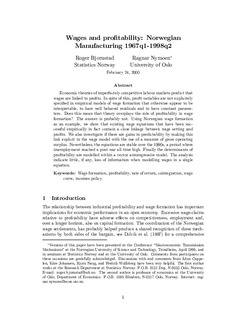Wages and Profitability: Norwegian Manufacturing 1967Q1 - 1998Q2
Working paper
Published version
Permanent lenke
http://hdl.handle.net/11250/2500535Utgivelsesdato
1999Metadata
Vis full innførselSamlinger
Sammendrag
Economic theories of imperfectely competitive labour markets predict that wages are linked to profits. In spite of this, profit variables are not explicitely specified in empirical models of wage formation that otherwise appear to be interpretable, to have well behaved residuals and to have constant parameters. Does this mean that theory overplays the role of profitability in wage formation? The answer is probably not: Using Norwegian wage formation as an example, it is shown that existing wage equations that have been successful empirically in fact contain a close linkage between wage setting and profits. The authors also investigate if there are gains in predictablity by making this link explicit in the wage model with the use of a measure of gross operating surplus. Nevertheless, the equations are stable over the 1990s, a period where unemployment reached a post war all time high. Finally the determinants of profitability are modelled within a vector autoregressive model. The analysis indicate little, if any, loss of information when modelling wages in a single equation.

